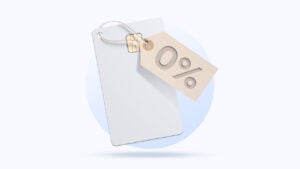10 credit card mistakes to avoid in 2025

Key takeaways
- Using a credit card responsibly can build your creditworthiness, but making these mistakes this year could have a negative impact on your credit.
- Paying in full and on time can save you from interest fees and hits to your credit score.
- Overspending, earning the wrong type of rewards and not monitoring your transactions or credit score are a few mistakes to avoid.
It’s 2025 — credit card mistakes and keeping up with the Joneses are out, and loud budgeting and responsible credit card use are in.
A credit card can be a powerful tool to have in your wallet, but only when it’s used responsibly. With a credit card, you can earn rewards and build your credit history as you spend. But it’s also possible to rack up interest fees and harm your creditworthiness.
“Issues with credit cards are very common, especially among younger and less informed consumers,” says Sean Salter, associate professor of finance at Middle Tennessee State University in Murfreesboro, Tennessee. “For younger consumers, many are tempted to elevate their lifestyle by using credit cards to make purchases that their income can’t support. Even older, more experienced consumers can fall into that trap. Credit cards are a financial tool, but it’s very difficult to maintain the discipline necessary to use them to your advantage.”
If you want to use credit cards well this year, work on developing good financial habits and avoiding bad ones. Here are a few common credit card mistakes to avoid:
1. Not paying on time
Sometimes, schedules are busy and budgets are tight. But it’s best to always pay at least part of your credit card bill on time. Missing or late credit card payments can have a big impact on your credit score, not to mention trigger costly fees.
Credit-scoring companies like FICO and VantageScore weigh your payment history as an important factor in your credit score. Payments that are more than 30 days late can show up on your credit report and stay there for seven years. Plus, once a payment is considered late, you may be charged a late fee and be on the hook for accruing interest charges. Continued missed payments could even lead to the card issuer raising your card’s interest rate.
This year, set up automatic credit card payments to avoid missing your due date. And if you accidentally miss a payment, still pay the balance as soon as possible. You may even be able to call the card issuer and ask them to waive the late fee.
2. Making only minimum payments
When you make the minimum payment on a credit card balance, you do avoid a late or missed payment, but that doesn’t mean you’re in the clear financially. The minimum payment is usually a set amount or percentage of the balance and paying it will keep you from having late payments, but it won’t do much to help you get out of debt. Making only minimum payments will allow your debt to stick around for longer and mean you end up paying more in interest.
This year, use your hard-earned income to pay for everything you charge on a credit card. And if you can’t afford to pay more than the minimum amount, it may be time to look at your budget. There could be ways to cut down on expenses or earn extra income so that you can pay for what you spend.
3. Carrying a balance
Nearly half of Americans carry a credit card balance from month to month, and about half of those people say emergency expenses like an unexpected car repair or medical bill are the primary cause, according to Bankrate’s Credit Card Debt Survey. But carrying a large balance can leave you sitting on hefty interest fees by the end of the year.
“The big issue here is that if you carry a balance, you transfer power to the credit card company,” warns Salter. “The carryover balance allows the company to charge interest on that balance — an interest rate that can be extremely high. To sidestep this mistake, your household budget should be the primary source of decision-making regarding how much money should be spent. If your budget won’t allow repayment within one month, the purchase should be avoided.”
Certainly you can’t anticipate every unexpected expense, but you can work to build an emergency fund so you can tackle those surprise expenses with cash instead of credit.
If you’re already in debt, make this the year you create a debt payoff plan that allows you to stop carrying a balance and start paying in full. This might require budgeting, starting a repayment plan like the snowball or avalanche methods or signing up for a balance transfer card.
If you have a large purchase coming up, consider alternatives to using a credit card — like saving up for it; using a buy now, pay later (BNPL) option; or applying for a personal loan.
4. Spending beyond your means
Using a credit card is different than paying with cash. You don’t feel the money leaving your wallet or bank account when you swipe. And repayment may seem far off — like future you’s problem. But are you spending more money than you make? Are you still working toward your savings goals?
Inflation has become a pain point for everyday spenders, and some people may feel that even paying for necessities is unaffordable. But it’s worth identifying things you’re paying for that are wants, not needs. Everyone deserves to have a little fun, but the number of concerts, shopping sprees or vacations you enjoy may depend on your income.
“To build credit and use your card responsibly, only make manageable purchases and have a budget or payment plan in place,” says Geri Hopkins, chief operations officer for Skyla Credit Union in Charlotte, North Carolina. “If you are already in credit card debt, you should use your card only in an emergency situation, create a budget that includes paying off your balance and consider a balance transfer — particularly onto a card that offers an extended period with 0 percent APR and no balance transfer fee so that you can consolidate and repay your debt more quickly.”
This year, get honest about your budget and how to live within your means.
5. Using the wrong card for your lifestyle
Not all credit cards are created equally, and various cards can serve different financial goals. If you’re still using a student card from your college days, you might not have a high enough credit limit to meet your needs or help keep your credit utilization low.
If you’re a frequent low-budget traveler eyeing travel cards with high annual fees and luxury perks, there might be a more reasonable travel card for you.
And if you’re new to credit cards, you could be tempted by a flashy celebrity endorsement for a card that you are unlikely to qualify for.
“Make sure to think through your purchases and determine which card will earn you the most perks and assess the lowest interest rate for that purchase,” explains Hopkins.
Rewards cards allow you to earn cash back or travel rewards as you spend on purchases you’d be making anyway, but there are myriad options out there. There’s no reason for you to have a card with boosted rewards on dining out if you prefer cooking at home — a card with elevated rewards on grocery purchases might be a better fit. Likewise, if you’re dreaming of traveling, but not so excited about the cost of doing so, a travel rewards card could be a simple way for you to work toward making those travel dreams come true.
This year, identify your biggest spending categories and your opportunities to cash in on rewards for them. You might be able to take your next trip at no cost or pay for a dinner date with rewards, depending on your lifestyle and spending habits.
Prioritize properly
6. Not monitoring transactions
If you’re not checking your credit card statement each month and monitoring your transactions, it’s time to start. A budgeting app can automatically track and categorize your transactions. That way, you can see how much you spend in certain categories and adjust as needed.
Monitoring your transactions can also help you spot recurring charges or subscriptions that you may no longer want. Plus, it’s important to watch for fraudulent charges or mistakes. This year, try to keep tabs on where your money goes, line by line, to take even more control over your finances.
7. Getting close to your credit limit
Your credit limit is the maximum amount available to spend on your credit card. And while it might seem like all of that money is yours to spend, it’s best to not use it up. The amount of your credit limit you spend versus what’s still available is called your credit utilization, and your credit utilization ratio affects your credit score.
Experts recommend keeping your credit utilization below 30 percent. If your credit limit is $10,000, that means trying to keep your spending under $3,000.
“If you go beyond your credit card limit, this can violate your credit card agreement and result in additional fees and penalties. It could also result in the lender freezing or canceling your credit card account, so avoid this at all costs,” says Hopkins. “If you want to increase your limit, request it from your credit card company. You’ll more likely receive an offer to increase your credit card limit automatically when you have demonstrated responsible card usage for a long time — meaning you’ve consistently made on-time payments or pay off your credit card balance in full regularly.”
To see how credit utilization impacts credit card approval rates, we looked at how Bankrate’s CardMatch users’ credit utilization ratios impacted their odds of receiving a new card. While it’s important to note that this data is not necessarily representative of what you might experience, we found that applicants utilizing less than 30 percent of their credit had a 91 percent card approval rate, compared to people using more than 30 percent with a 66 percent approval rate.
This year, try to spend well below your credit limit to improve your credit score (and your chances of being approved for future credit).
8. Applying for too many credit cards
Even if you’re eager to get a new credit card for the right reasons — like having access to more credit (which can lower your credit utilization) or earning better rewards — it’s a mistake to apply for a bunch of cards at once. That’s because each card application can trigger a hard inquiry on your credit, which impacts your credit score.
New credit makes up 10 percent of your FICO score and 5 percent of your VantageScore. And opening a new line of credit can decrease your average credit age, which is another credit-scoring factor.
“Opening too many credit cards can lead to multiple hard inquiries on your credit report, temporarily lowering your credit score. You should aim for no more than two to four inquiries annually across all loan types,” Hopkins warns. “Also, keeping unused credit cards open is advisable. This maintains a longer credit history and increases available credit — two factors that influence your credit score. Just be sure to use your old cards periodically to keep them active, regardless of the transaction amount, and monitor them for potential fraud.”
This year, try using pre-approval tools to find the one card to apply for before triggering a hard inquiry. If you’re hoping to get more than one card, you may want to wait 90 days to six months between credit card applications.
9. Not discussing credit with family members
About 40 percent of Americans who are married, in civil partnerships or living with a partner have kept a financial secret from their significant other, according to Bankrate’s Financial Infidelity Survey. Even though talking about money can be tricky, it’s a worthwhile conversation — especially if expenses or debt are racking up in your relationship. Some people may want to keep their finances private. But talking about how much you and your partner want to spend, save and invest can help avoid money mishaps later down the road.
Adding a family member as a co-signer or authorized user can also help them build their credit history and learn to use credit responsibly. Just make sure to understand the difference between the two terms and how the other person’s credit use can affect your credit score. Make this the year you talk about money with the people who matter most.
10. Not keeping an eye on your credit
Lastly, not monitoring your credit history and score is a financial faux pas. AnnualCreditReport.com offers Americans a weekly free copy of their credit reports from the three major credit bureaus. You can check these reports for accuracy and file a dispute for anything that doesn’t look right.
Your free reports won’t include your score, but many card issuers offer score monitoring for their clients — and sometimes even for people who aren’t clients. This year, make it a goal to stay on top of your credit story and correct any mistakes you find to make way for a stronger credit future.
The bottom line
While using your credit cards responsibly this year might take a little extra work, the payoff is worth a lot — from saving money to building credit to earning rewards. Bankrate’s CardMatch tool can help you choose your next card and improve your chances for approval, but you still have to build responsible habits once you have the card.
Credit cards are useful financial tools when you’re mindful to avoid the pitfalls and wisely make them work for you.
Why we ask for feedback Your feedback helps us improve our content and services. It takes less than a minute to complete.
Your responses are anonymous and will only be used for improving our website.






